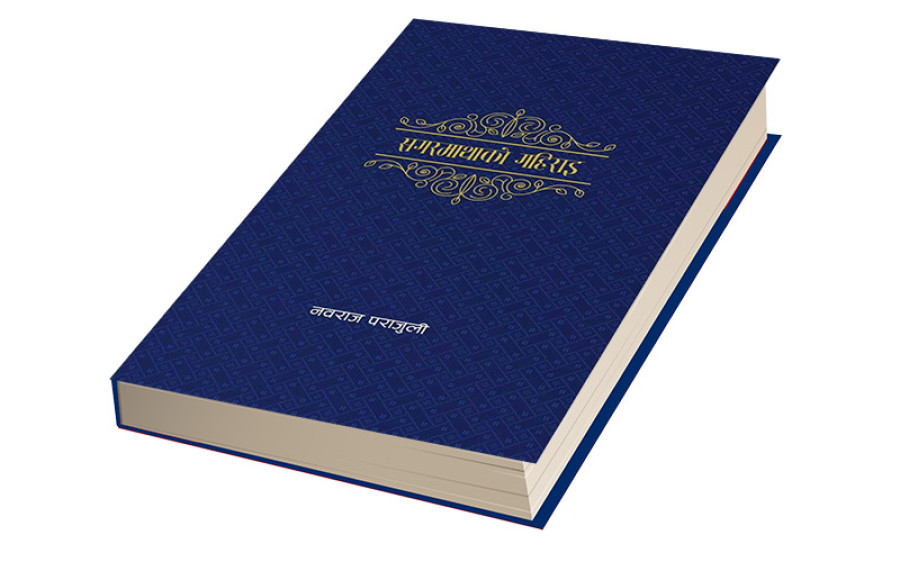Entertainment
Parajuli’s Sagarmatha ko Gahirahi bags Padmashree award
Poet Nawaraj Parajuli’s anthology of poetry Sagarmatha ko Gahirahi has been awarded this year’s Padmashree Award, the Khemkala-Harikala Lamichhane Foundation announced on Thursday.
Samikshya Bhattarai
Poet Nawaraj Parajuli’s anthology of poetry Sagarmatha ko Gahirahi has been awarded this year’s Padmashree Award, the Khemkala-Harikala Lamichhane Foundation announced on Thursday.
The Foundation, which administrates the award, also announced Rochak Ghimire and Nagendraraj Sharma as the recipients of this year’s Padmashree Sadana Samman.
Sagarmatha ko Gahirahi, a poetry anthology with 36 poems, is Parajuli’s first book. The poems in the book cover an array of themes ranging from social issues and politics to philosophy and love. Parajuli, who ventured out into poetry with Slam Poetry, is also the winner of the All Nepal Poetry Slam, 2014, and the recipient of Saatako Sahitya Puraskar. He is also active in Kathmandu’s theatre scene and performance arts.
The Academy had shortlisted five books—Kahar by Janakraj Sapkota, Ghatmandu by Kumar Nagarkoti, Chhaughar by Raj Sargam, Rolpa Suyeha by Nabin Bibhas, and Sagarmatha ko Gahirahi by Nawaraj Parajuli—for this year’s Padmashree Award.
Speaking about the award, which was established in 2005, Jiba Lamichhane, conservator of the Academy, said, “We are honoured to encourage good writers and their literary work through the Academy.” He added, “The book is selected through a rigorous discussion with scholars and critics, and the winner is what the adjudication panel deemed the best for the week.”
The Academy will present both the awards—Padmashree Award and Padmashree Sadhana Samman—along with a purse of Rs 200,000 on October 5. Chirharan by author Neelam Karki ‘Niharika’ had bagged the Padmashree award last year.

Conversation with Nawaraj Parajuli
Why was Sagarmatha ko Gahirahi so popular with readers? What themes did the readers connect to?
Most of the poems in my book are about relationships—the relationship between mothers and sons, fathers and daughters, brothers and sisters, us and the society and others. As we all share one or more of these relationships, it is very easy to connect with the poems. I think this very theme of my poems being applicable to most of our emotions made it so popular.
You were a slam poet first, how has the transition been to mainstream poetry? How is it different?
I wouldn’t call myself a slam poet because I do not create poems with performance in mind. I actually write the poems beforehand and it is only later that I perform it because I love to do so. Sometimes, people mistake me for being a slam poet as I perform my poems. But when I write poems they are written in the format which you can publish, so the transition to mainstream poetry was not applicable to me.
You’ve been awarded this year’s Padmashree Award, which is no doubt a big honour. What would you say is the biggest achievement for an author?
It’s really a great honour to recieve such a prestigious award. Awards like these are really good for exposure and recognition as it helps new writers like me reach a wider audience. But when it comes to highest honour for a writer, I think for me it will always be my connection with the readers. For me, if the readers can relate to my poems and feel the emotions that I put into my work, there is no bigger honour than that.
You recently completed a five-city poetry tour to Australia. What does it say about Nepal’s literature landscape that authors are now able to travel abroad to read and perform for readers?
The fact that poets now can travel abroad just because of poetry speaks volumes about the current development of poetry in the country. I think we are on our way to develop an eco-system where poets and authors can make a living solely from writing. I think this is a very positive sign for literature and will encourage new writers to make forays into the medium.




 10.93°C Kathmandu
10.93°C Kathmandu










